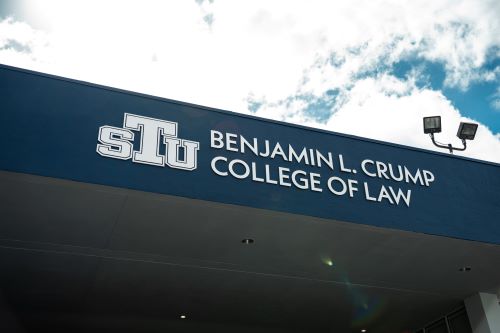Tenured professor sues St. Thomas College of Law after firing

Lauren Gilbert, who received full tenure in 2009, received a letter July 18 signed by Tarlika Nunez-Navarro, dean of the the Miami Gardens, Florida-based law school, stating that she was terminated immediately and given one day to clear out her office and return university property. (Photo courtesy of St. Thomas University)
Updated: A tenured professor filed a civil lawsuit against the St. Thomas University Benjamin L. Crump College of Law in the Eleventh Judicial Circuit in Miami-Dade County after being fired, claiming she did not receive due process in violation of her contract.
Lauren Gilbert, who received full tenure in 2009, received a letter July 18 signed by Tarlika Nunez-Navarro, dean of the Miami Gardens, Florida-based law school, stating that Gilbert—who taught contracts, constitutional law and family law—was terminated immediately and given one day to clear out her office and return university property.
According to the letter, grounds for the firing include an altercation in which she grabbed a security guard in 2010 as well as more recent incidents, among them being dismissive of rumors about an active shooter on campus; emails that disparaged the hiring of one adjunct professor; and behavior at faculty meetings that included “directing comments toward the dean that were inappropriate and inconsistent with the standards of conduct and professionalism.”
The issue is not whether there is adequate cause for termination but that the law school did not comply with Gilbert’s employment contract terms that demand due process before termination, says David Frakt, Gilbert’s Fleming Island, Florida-based attorney.
“Essentially, they have treated her as an at-will employee,” adds Frakt, who specializes in cases involving academia. “Once you make tenure, and especially if you make full professor, you’re guaranteed a job for life.”
The termination letter, submitted as evidence, references the university employee handbook’s termination policy that “reserves the right to terminate an employee, without warning, for any reason or no reason” when violations of safety rules are involved. The letter cited Gilbert violated the employee handbook when she refused to submit a written statement for the university’s investigation of the false active shooter incident.
However, there is a faculty handbook for the law school with different regulations, Frakt says.
Founded in 1984 with an enrollment of 689 students last year, St. Thomas College of Law, like all ABA-accredited law schools, is required to have a policy regarding academic freedom and tenure, per Standard 405(b). That policy is included in the St. Thomas law school faculty handbook (the 2021-2022 edition of the faculty handbook was included as evidence) and states tenured faculty members “may be terminated only for adequate cause.”
Where facts are in dispute, the faculty member has the right to “the informal and formal procedures” set by the Association of American Law Schools in a code approved in 1967, according to the lawsuit. Those include a hearing in front of their tenured peers, the suit says.
Current AALS guidelines, though, do not include those procedures.
The faculty handbook also states that tenured faculty “who are dismissed for reasons not involving moral turpitude shall receive their salaries” during the dispute process.
If the university wanted to terminate her, they must follow those rules listed in the faculty handbook, according to the complaint.
“The law school dean and the president probably understood if they followed the process for terminating tenured professors that requires a hearing in front of other tenured professors,” Frakt says, “the fellow tenured law professors would not do what they were going to be asking them to do. That’s why they want to circumvent the process.”
Attorneys from the firm Akerman, which is representing the university, deferred to the law school for comment.
According to a statement from St. Thomas University sent to the ABA Journal, “The law school is fully adhering to our guidelines by providing Lauren Gilbert with a hearing. Our investigation into a very serious matter involving Gilbert’s conduct is ongoing.”
When asked to clarify whether there was or will be a hearing, a university spokesman did not explain, and referred back to the statement, calling this “our investigation.”
“What they have done is completely indefensible, and it’s very troubling that this is a law school in particular that is doing it, that is run by lawyers, and the dean is a former judge. The president is also an attorney,” Frakt says.
The American Association of University Professors wrote a letter of support Aug. 1 on Gilbert’s behalf to the university stating the firing without a faculty hearing is “fundamentally at odds with basic standards of academic due process.” After not receiving a response, a follow-up letter was sent Aug. 13.
While Gilbert is seeking to be returned to her position, she told the Journal she remains open to the possibility of “a reasonable settlement.”
Updated Aug. 21 at 1:25 p.m. to clarify the Association of American Law Schools procedures.
Write a letter to the editor, share a story tip or update, or report an error.


